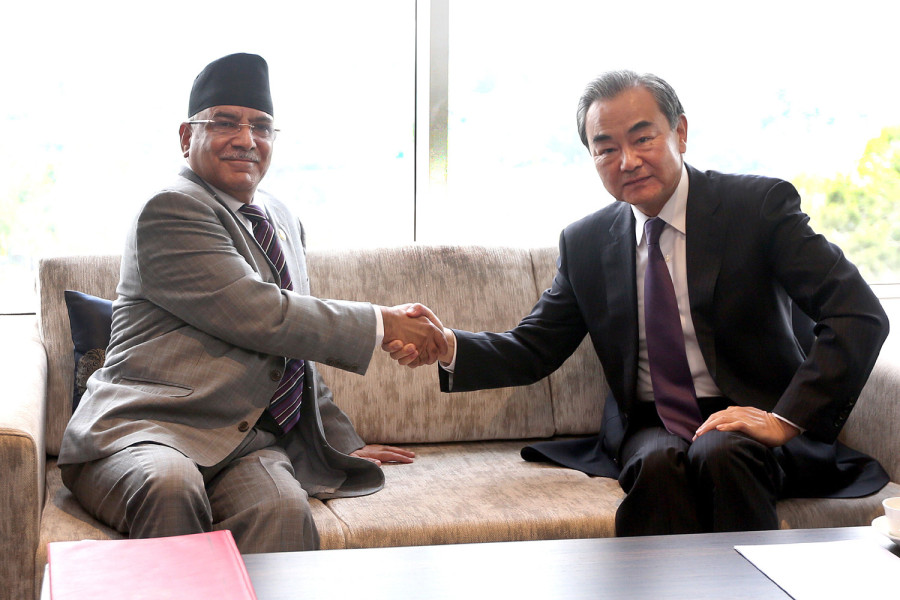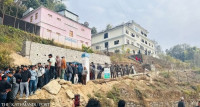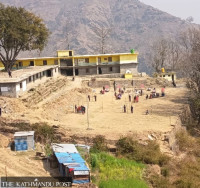National
Nepal disapproves of Washington's Indo-Pacific Strategy, Beijing says
According to a statement released by Chinese foreign ministry, Pushpa Kamal Dahal, the ruling communist party co-chairman, disavowed the Washington-led initiative.
Anil Giri
Hours after Chinese State Councillor and Foreign Minister Wang Yi wrapped up his three-day Nepal visit, a series of statements released by Beijing said Kathmandu disapproves of the Indo-Pacific strategy, potentially creating a new diplomatic debacle for the ruling Nepal Communist Party.
In five separate statements released by China’s Ministry of Foreign Affairs on Tuesday, the Chinese government said Nepal has termed the ongoing agitation in Hong Kong as China’s internal affairs and all five key Nepali leaders—President Bidya Devi Bhandari, Prime Minister KP Sharma Oli, Foreign Minister Pradeep Gyawali, Nepali Congress President Sher Bahadur Deuba and NCP Co-chair Pushpa Kamal Dahal—assured Wang that Nepal strictly adheres to one-China policy and will not allow external forces to promote anti-China activities in the country.
But a single phrase in China’s statement about Wang’s meeting with Dahal could raise eyebrows, both in Kathmandu and Washington, reminiscent of the diplomatic kerfuffle between the two countries earlier this year.
“Nepal firmly adheres to the non-alignment policy, disapproves of the so-called ‘Indo-Pacific strategy’, opposes any attempt to stop the development of China, and always believes that China's development is an opportunity for Nepal and is willing to learn from China's successful experience,” the statement says.
According to the statement, Dahal told the Chinese foreign minister that Nepal not only verbally, but also firmly adheres to the one-China policy in its actions and will not allow any outside elements to engage in anti-China activities in Nepal.
[Read: US says Nepal is part of its Indo-Pacific strategy]
This is the first time a senior ruling party leader has spoken about the Indo-Pacific strategy, let alone voiced an opinion “disapproving” of it. The statement on the US-led initiative comes at a time when Washington and Beijing are not only sparring with each other over issues of trade and security but also attempting to counter and contain each other’s strategies.
A member of Dahal’s secretariat told the Post that the two leaders discussed issues ranging from the Hong Kong unrest to the Indo-Pacific Strategy but stopped short of confirming the details of the conversation between them.
Narayan Kaji Shrestha, the spokesperson for the ruling party, said that though Hong Kong has never been part of any discussion in any official forum, the party is clear on the Indo-Pacific Strategy.
“The party and the government have a clear view that Nepal should not be dragged into it,” Shrestha said, hinting that neither the government nor the ruling party should be involved in the Indo-Pacific Strategy.
Debate over whether or not Nepal is part of the Indo-Pacific Strategy has been going on for close to a year, particularly following Gyawali’s visit to the United States in December. In a statement released by the US State Department last year, officials in Washington said Nepal is a part of their ambitious strategy in the pan-Asian region.
But days later, the foreign minister rejected reports that Nepal had supported the United States in its Indo-Pacific strategy.
Washington’s Indo-Pacific Strategy is largely seen as a policy aimed at countering and containing the rise of China. As the rivalry between the two countries heats up, both US and Chinese officials in Kathmandu have tried to counter each other’s initiatives—Indo-Pacific Strategy and the Belt & Road Initiative—in the past.
Earlier in January, Dahal’s statement criticising the US and its allies’ intervention in the internal affairs of Venezuela became a diplomatic headache for Nepal as well as the ruling party. Dahal’s statement had prompted the US government to seek a clear position from Nepal on Venezuela.
A former Nepali envoy to Washington said Dahal’s statement on the Indo-Pacific Strategy could frustrate the United States once again.
“We have already accepted Hong Kong as a Special Administrative Region, so I do not see much problem with it. But as far as the Indo-Pacific Strategy is concerned, it will definitely irk the US,” said Suresh Chalise, a former Nepali ambassador to the United States. “We have to be a part of the economic component of the Indo-Pacific Strategy. Our foreign policy objective should be aimed at seeking strategic autonomy, not aligning with any major powers.”
Though Washington continues to maintain that Nepal is part of the Indo-Pacific Strategy, and American officials have not minced words while reminding Kathmandu of the risks associated with the Belt and Road Initiative, the leadership in Kathmandu has, so far, stopped short of saying whether Nepal is part of the strategy.
Apart from assistance in a number of sectors, the significant $500 million Millennium Challenge Account is considered a project under the Indo-Pacific Strategy.
Nepal joined the Beijing-led Belt & Road Initiative in 2017, but there has not been any significant progress on the agreements for any major projects under the initiative.
While Kathmandu has hailed Wang’s visit, no significant deals or no major announcements were signed or made this week. Still, many officials in Kathmandu have described the Chinese foreign minister’s trip as a precursor to a visit by President Xi Jinping as early as next month.
READ RELATED STORIES:
- Indo-Pacific Strategy is not against any country, visiting US official asserts
- Gyawali refutes reports about Nepal joining US Indo-Pacific strategy
***
What do you think?
Dear reader, we’d like to hear from you. We regularly publish letters to the editor on contemporary issues or direct responses to something the Post has recently published. Please send your letters to [email protected] with "Letter to the Editor" in the subject line. Please include your name, location, and a contact address so one of our editors can reach out to you.




 25.15°C Kathmandu
25.15°C Kathmandu















